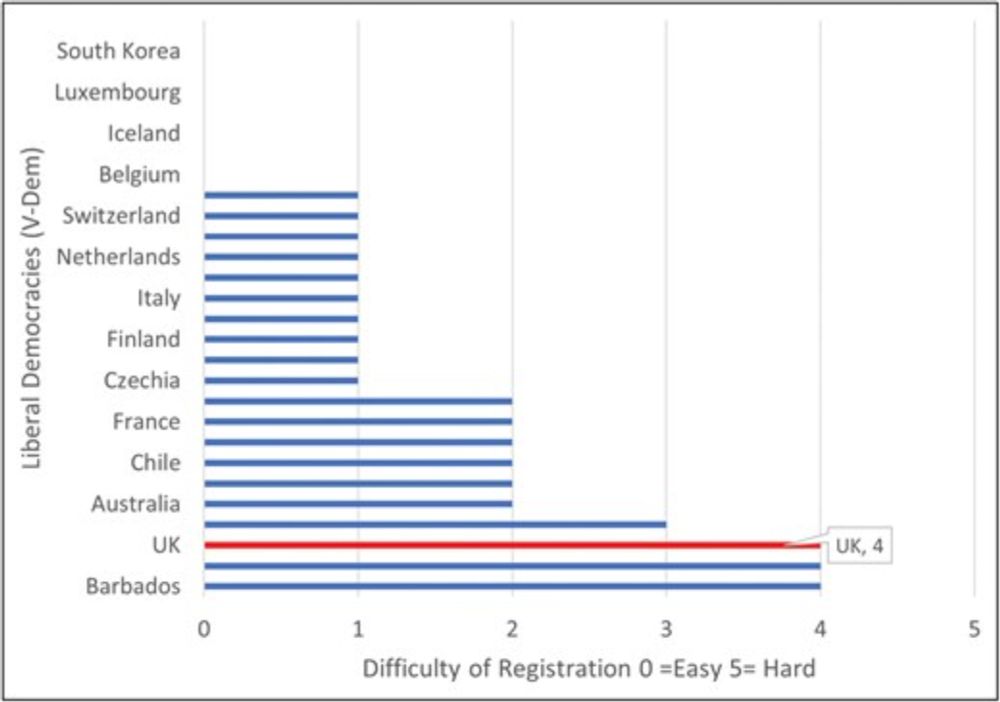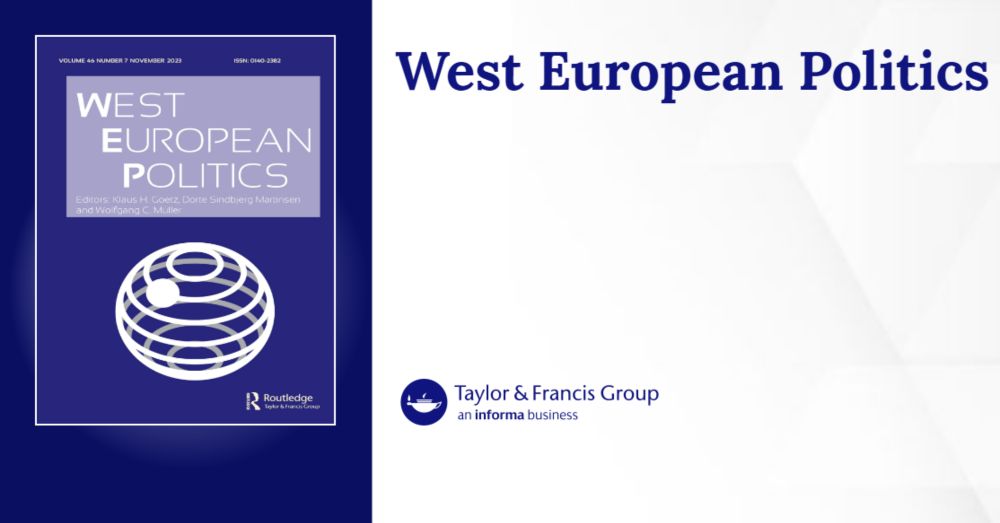
Judicial diversity and immigration appeals: evidence from the United Kingdom
Almost all studies of judicial behaviour and diversity conceptualise judges’ race and gender as independent, additive variables. Specifically, black and female judges are often seen as more liberal...
I have a new paper out in @wepsocial.bsky.social looking at immigration rulings in the UK (doi.org/10.1080/0140...). It's a short read, but the two main findings are:
1) the success of an immigration appeal depends a lot on who the deciding judge is
2) BAME women are (surprisingly) strict judges
30.07.2025 15:37 — 👍 5 🔁 4 💬 1 📌 0
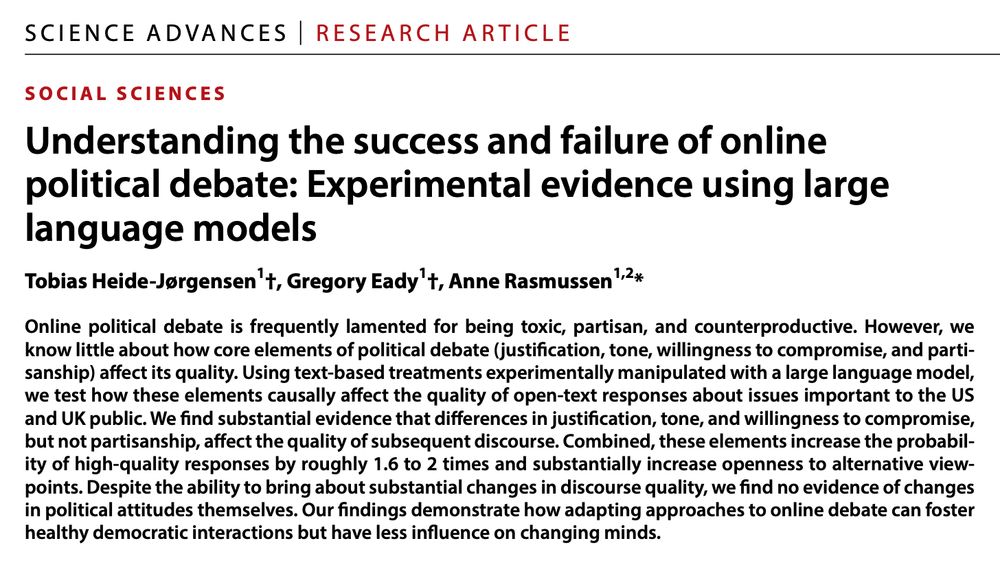
🚨 New paper in Science Advances @science.org
Can changing how we argue about politics online improve the quality of replies we get?
T HeideJorgensen, @gregoryeady.bsky.social & I use an LLM to manipulate counter-arguments to see how people respond to different approaches to arguments
Thread 🧵1/n
28.07.2025 08:36 — 👍 34 🔁 10 💬 1 📌 2
YouTube video by Trans European Policy Studies Association (TEPSA)
Studying polarisation with social media data | Alex Hartland | #ActEU Mid-Term Conference
How is #polarisation reflected on social media❓ @uni-saarland.de's @alexhartland.bsky.social responded to this question in his presentation at the #ActEU mid-term conference 🎓
Check it out on YouTube 👉 youtu.be/3l9XQFZAlQU
24.07.2025 12:55 — 👍 5 🔁 1 💬 0 📌 0
🚨Job Alert
W2 (TT W3) Professorship in Computer Science "AI for People & Society"
@saarland-informatics-campus.de/@uni-saarland.de is looking to appoint an outstanding individual in the field of AI for people and society who has made significant contributions in one or more of the following areas:
18.07.2025 07:11 — 👍 13 🔁 17 💬 1 📌 0
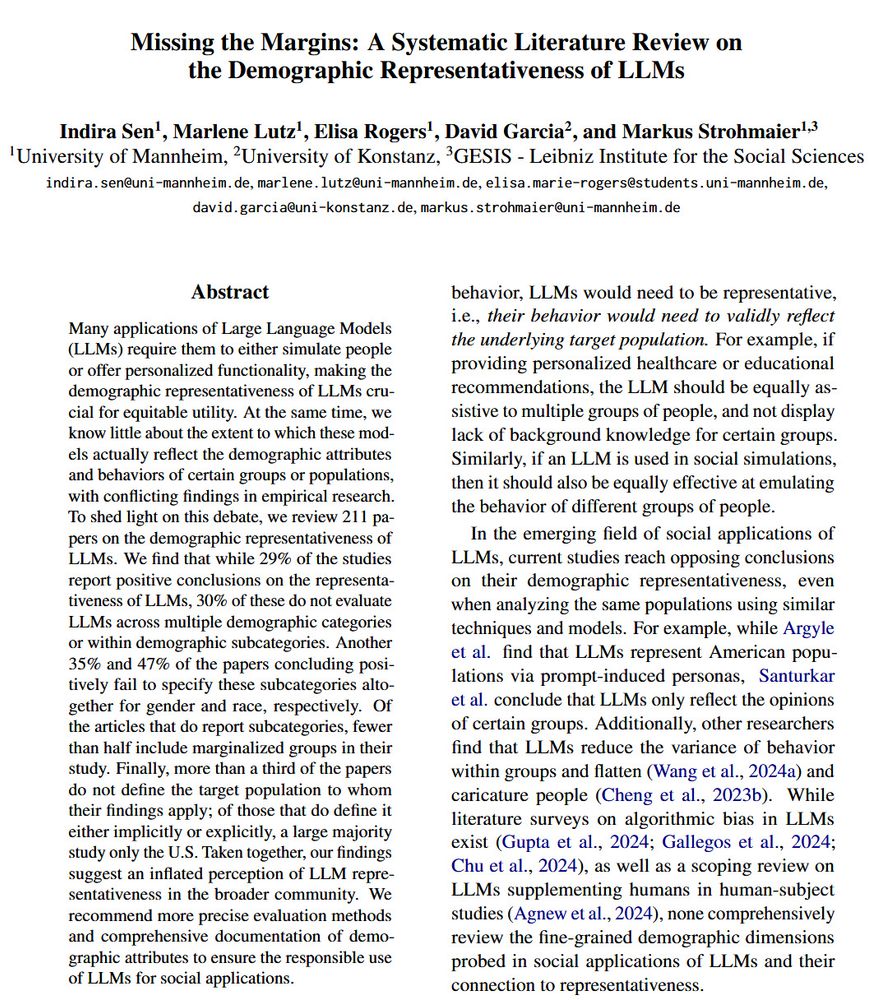
Screenshot of our paper "Missing the Margins: A Systematic Literature Review on the Demographic Representativeness of LLMs"
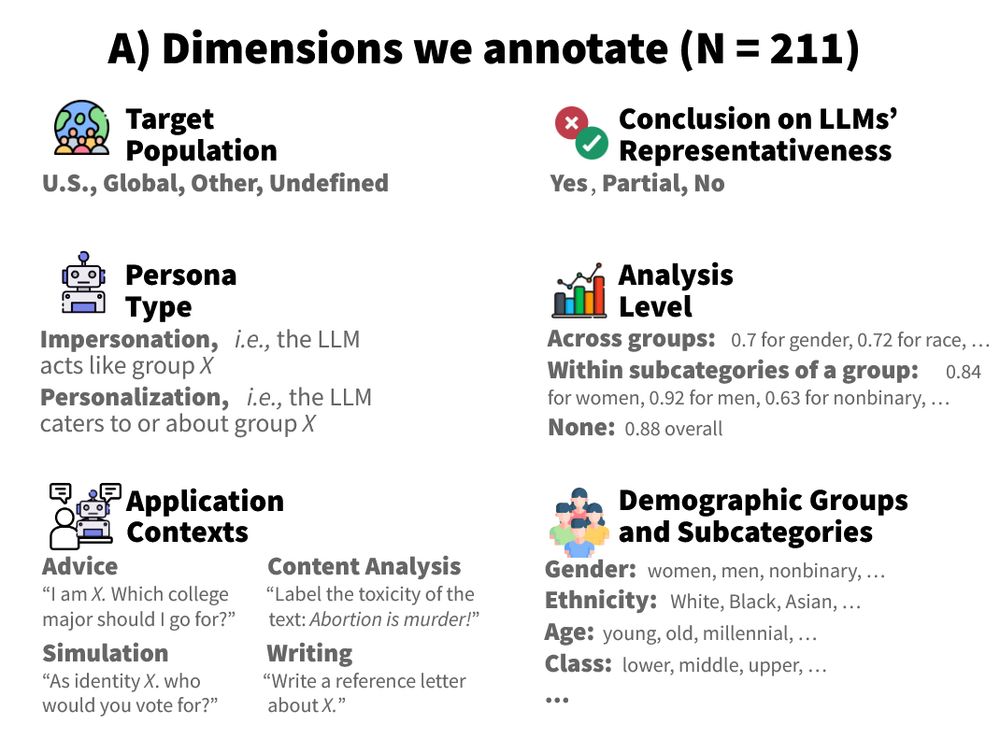
Details about what we annotated in our systematic review
Do LLMs represent the people they're supposed simulate or provide personalized assistance to?
We review the current literature in our #ACL2025 Findings paper and investigating what researchers conclude about the demographic representativeness of LLMs:
osf.io/preprints/so...
1/
21.07.2025 10:11 — 👍 23 🔁 8 💬 1 📌 2
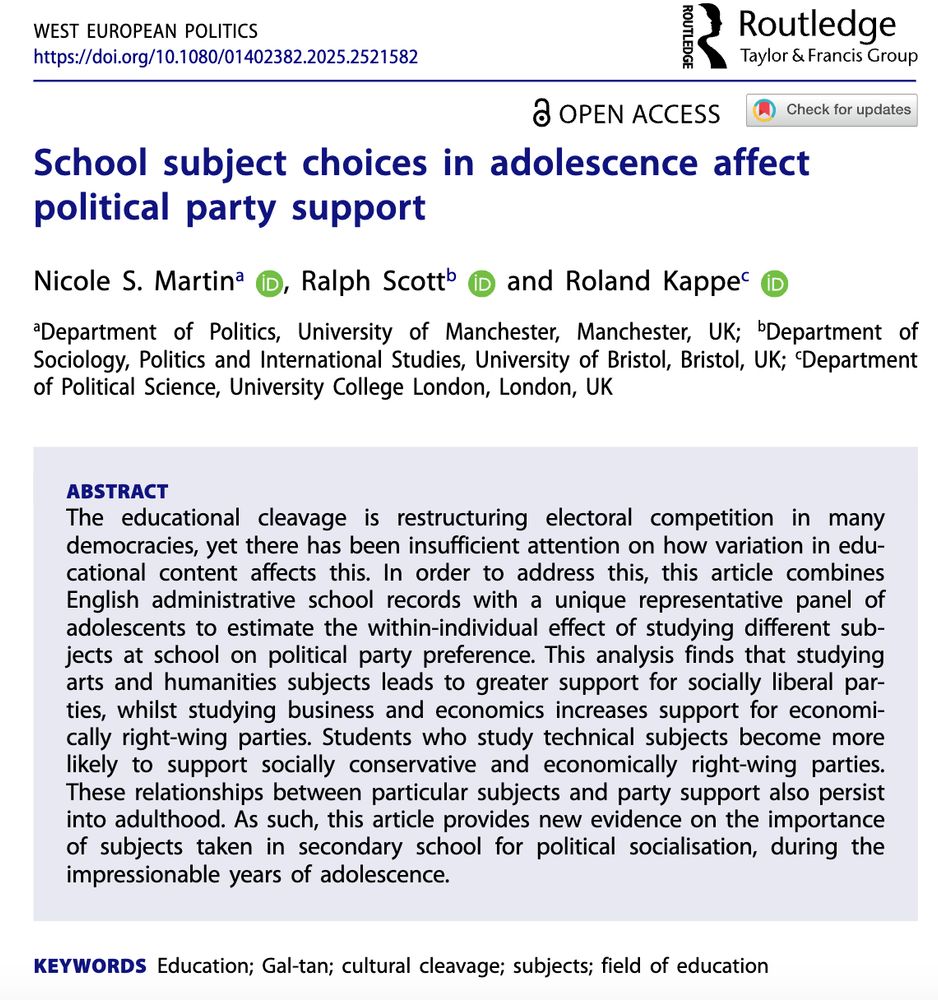
Article abstract, which says:
The educational cleavage is restructuring electoral competition in many democracies, yet there has been insufficient attention on how variation in educational content affects this. In order to address this, this article combines English administrative school records with a unique representative panel of adolescents to estimate the within-individual effect of studying different subjects at school on political party preference. This analysis finds that studying arts and humanities subjects leads to greater support for socially liberal parties, whilst studying business and economics increases support for economically right-wing parties. Students who study technical subjects become more likely to support socially conservative and economically right-wing parties. These relationships between particular subjects and party support also persist into adulthood. As such, this article provides new evidence on the importance of subjects taken in secondary school for political socialisation, during the impressionable years of adolescence.
📣 NEW PAPER ALERT! 🚨
"School subject choices in adolescence affect political party support"
Just published in @wepsocial.bsky.social with @nspmartin.bsky.social and @rolandkappe.bsky.social.
doi.org/10.1080/0140...
🧵👇
14.07.2025 13:13 — 👍 70 🔁 44 💬 4 📌 3
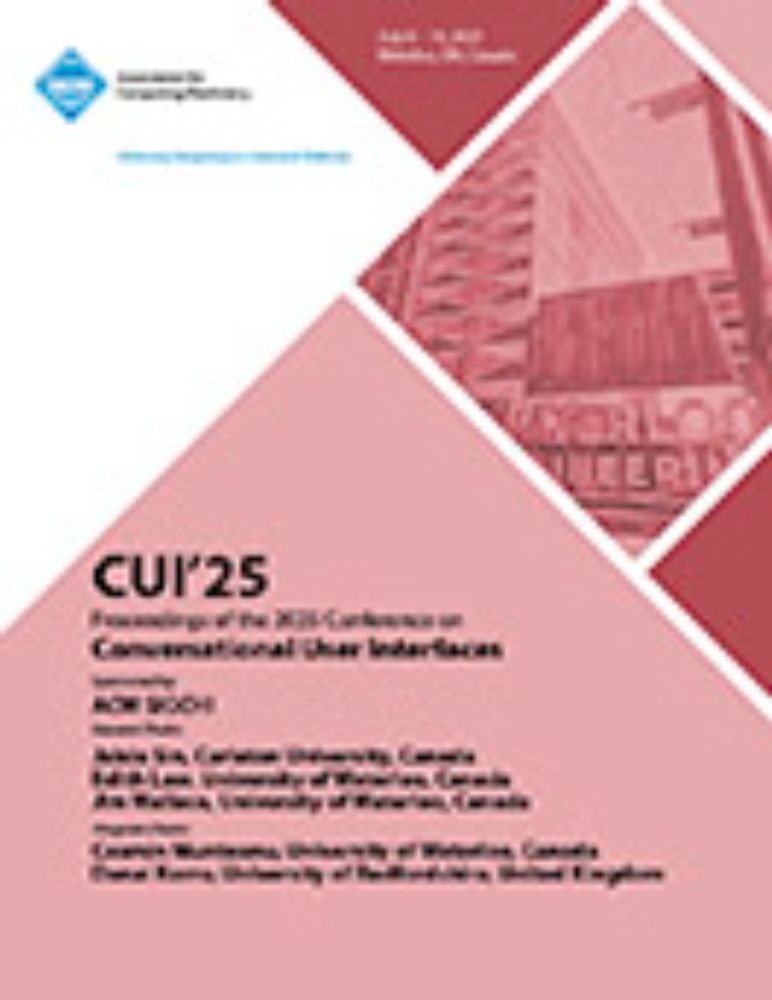
Exploring LLMs for Automated Generation and Adaptation of Questionnaires | Proceedings of the 7th ACM Conference on Conversational User Interfaces
I am happy to share that our work titled "Exploring LLMs for Automated Generation and Adaptation of Questionnaires" has been accepted to the ACM Conversational User Interfaces (CUI) Conference 2025.
Check our work: doi.org/10.1145/3719...
@cui.acm.org #CUI2025 #ACM
09.07.2025 19:23 — 👍 3 🔁 4 💬 1 📌 0
Extremely happy to see my first single-authored paper published! Check it out in @ersjournal.com 👇
04.07.2025 09:46 — 👍 24 🔁 9 💬 0 📌 0
In doing so we find that the UK's registration difficulty level is closer to that of countries transition in and out of democracy, as opposed to other electoral democracies (according to V-Dem's categorization)
03.07.2025 15:09 — 👍 2 🔁 2 💬 1 📌 0

Cover
Our new #PoliSci collected volume on border regions as laboratories of European research is finally here. Check it out (in German): www.nomos-elibrary.de/de/10.5771/9...
01.07.2025 13:19 — 👍 2 🔁 2 💬 0 📌 1
A key function of the state is to ensure the #welfare of its citizens. But do more generous welfare policies also foster more #political #trust?
🎉 Our paper, co-authored with Matthijs Gillissen and Anna Ruelens, was accepted @polstudies.bsky.social!
@vd-researchgroup.bsky.social #HIVA
23.06.2025 15:38 — 👍 7 🔁 2 💬 1 📌 0
Wann join us in Vienna? 😊Apply for a 4year phd position with the @compcommlab.bsky.social
06.06.2025 09:15 — 👍 5 🔁 4 💬 0 📌 0
Here's another workshop at the intersection of #NLProc and politics: cpss-sig.github.io/CPSS-2025/cf...
Deadline is June 13th, if you have any questions about the submission format, ping me, @gabriellalapesa.bsky.social @cklamm.bsky.social or @dede1989.bsky.social
01.06.2025 19:25 — 👍 6 🔁 2 💬 0 📌 0
@politicsunisaar.bsky.social
30.05.2025 11:16 — 👍 0 🔁 0 💬 0 📌 0
YouTube video by Trans European Policy Studies Association (TEPSA)
Triggers of political engagement | Alex Hartland | #ActEU Mid-Term Conference
What are the drivers of political #engagement in Europe❓ #ActEU researcher @alexhartland.bsky.social (@uni-saarland.de) explores the triggers of political participation in our latest video recording from our December mid-term conference 📺
Watch it on YouTube ➡️ youtu.be/M7Rcmco6jCQ?...
30.05.2025 10:25 — 👍 4 🔁 4 💬 1 📌 0
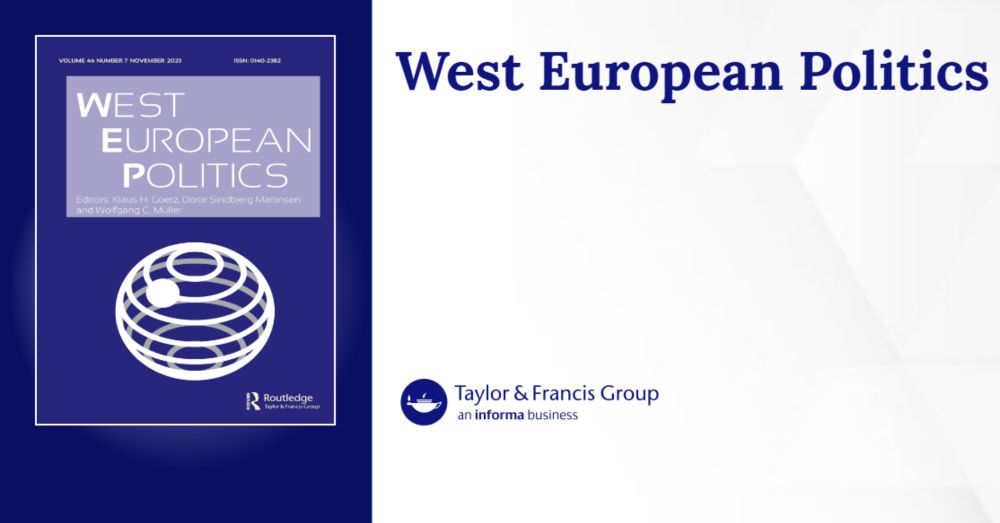
The role of key European issues in the 2024 election campaign
International crises and Euroscepticism have made European issues prominent in citizens’ lives. This article studies the role of three key European issues – migration, the environment, and EU integ...
🛎️ New Publication 🛎️
How did public and party priorities interact during the 2024 European Parliament elections?
In our new @wepsocial.bsky.social article, Daniela Braun, @giucarny.bsky.social @rosanavarrete.bsky.social @annreinl.bsky.social and I find some connections
tinyurl.com/yhc4ae8m
🧵
26.05.2025 07:20 — 👍 27 🔁 17 💬 2 📌 2
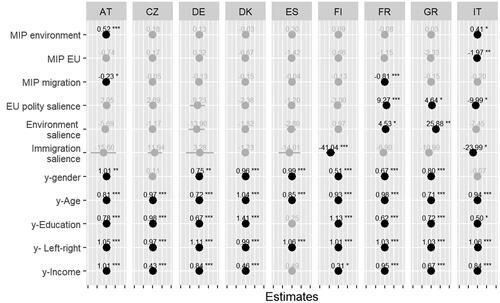
Baseline models. PTVs by most important issue, manifesto salience and individual variables. Note: Multilevel regression models with random intercepts for individuals and parties.
As migration, climate change, and other issues cut across borders, we would expect increasing links between public and party salience
In reality, we find the relationship is largely dependent on the issue and country context. PTVs increase where parties talk more about migration or the environment
26.05.2025 07:20 — 👍 7 🔁 2 💬 1 📌 0
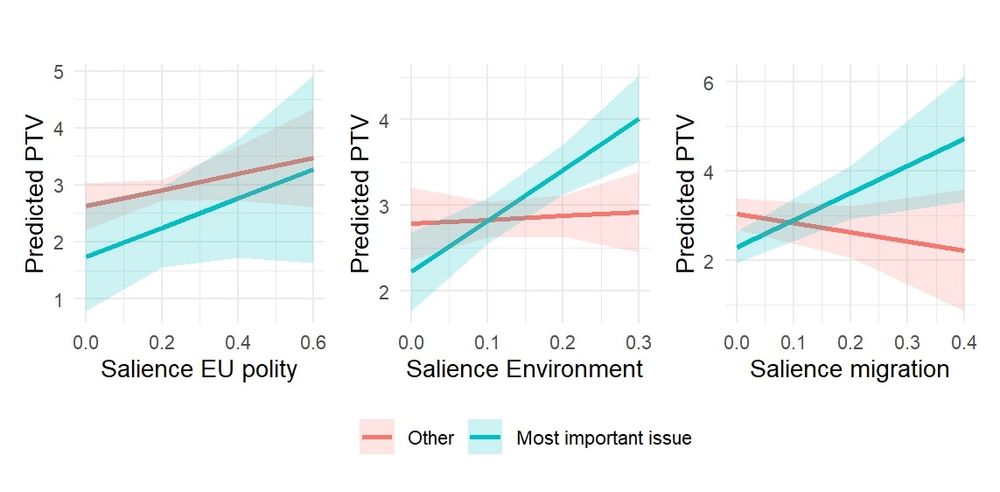
Pooled model interactions. Note: Multilevel models with random intercepts for respondent, party and country and random slopes for the most important issue at the country level
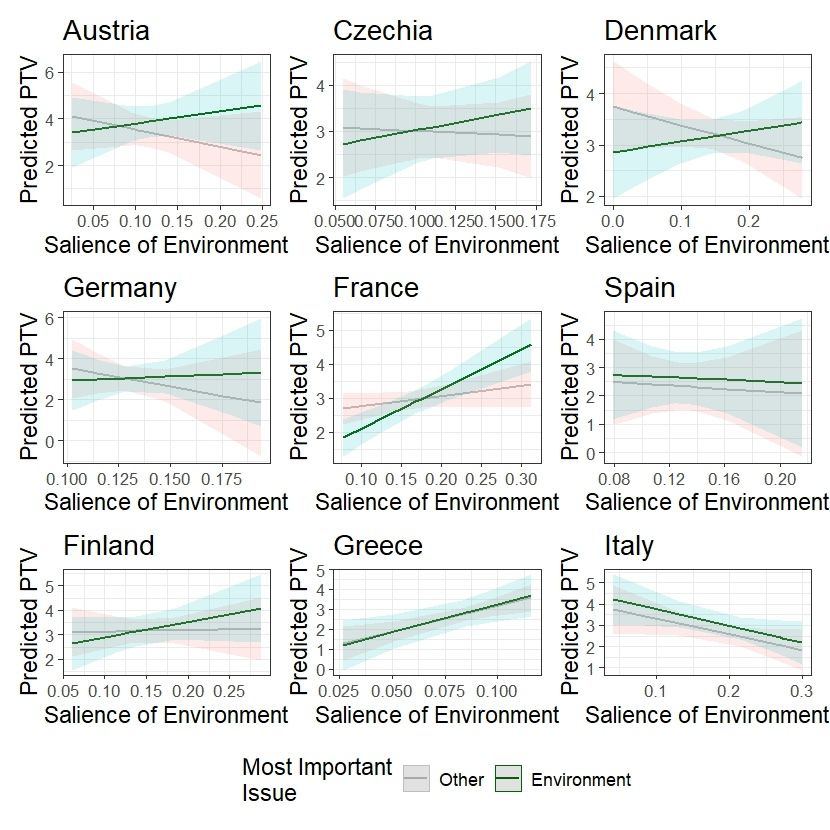
Multilevel models for the interaction of environment salience
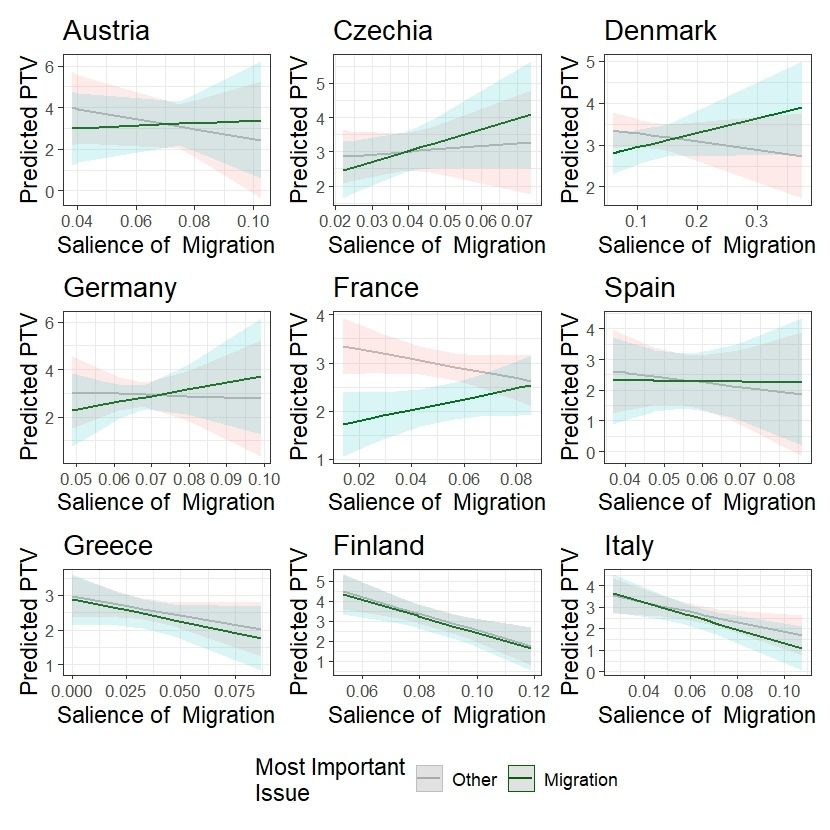
Multilevel models for the interaction of migration salience
But this is not consistent across the public as a whole.
Where we really see a difference is in the mediating effect of individual priorities. When the public cares, they support parties who care too.
We see this in both our aggregate and country-level analysis on migration and the environment.
26.05.2025 07:20 — 👍 6 🔁 2 💬 1 📌 0
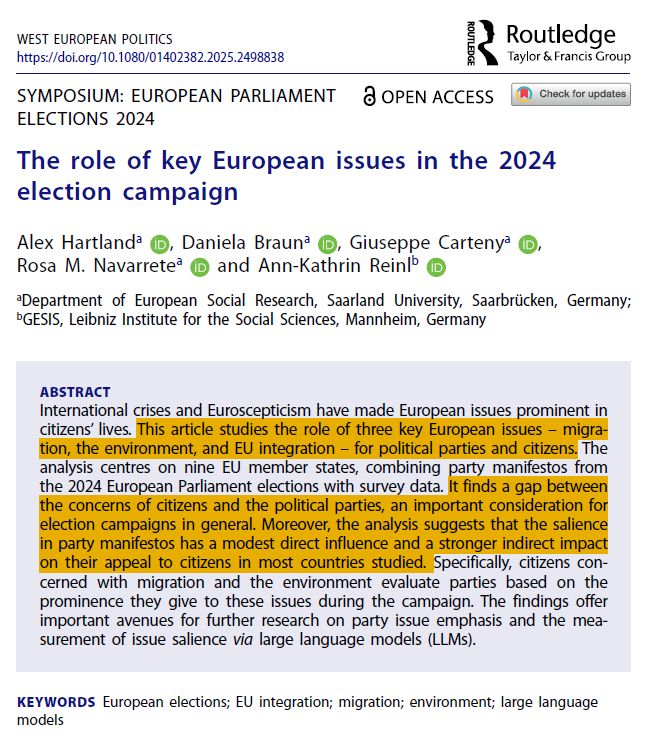
Abstract of the article "The role of key European issues in the 2024 election campaign" by Alex Hartland, Daniela Braun, Giuseppe Carteny, Rosa M. Navarrete and Ann-Kathrin Reinl.
Published online first in West European Politics.
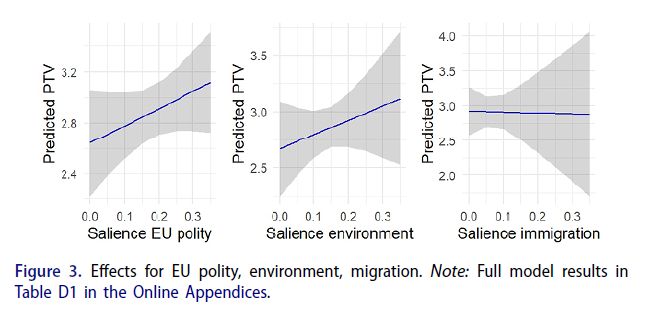
Figure 3, displaying the effects of EU polity (left panel), environment (middle panel), and migration (right panel).
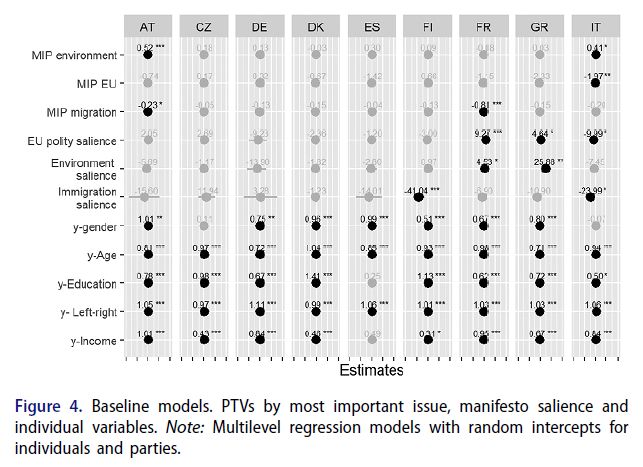
Figure 4, displaying the PTVs by most important issue, manifesto salience and individual variables for nine countries.
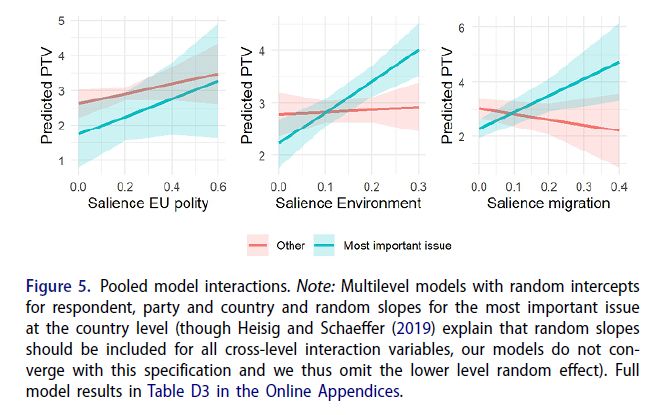
Figure 5, displaying pooled model interactions. Salience EU policy (left panel), Salience Environment (middle panel), and Salience migration (right panel).
@alexhartland.bsky.social Daniela Braun @giucarny.bsky.social @rosanavarrete.bsky.social & @annreinl.bsky.social observe a gap between the concerns of citizens & the issues political parties emphasise.
doi.org/10.1080/0140...
Part of the Symposium "European Parliament Elections 2024"
26.05.2025 13:48 — 👍 9 🔁 6 💬 0 📌 0
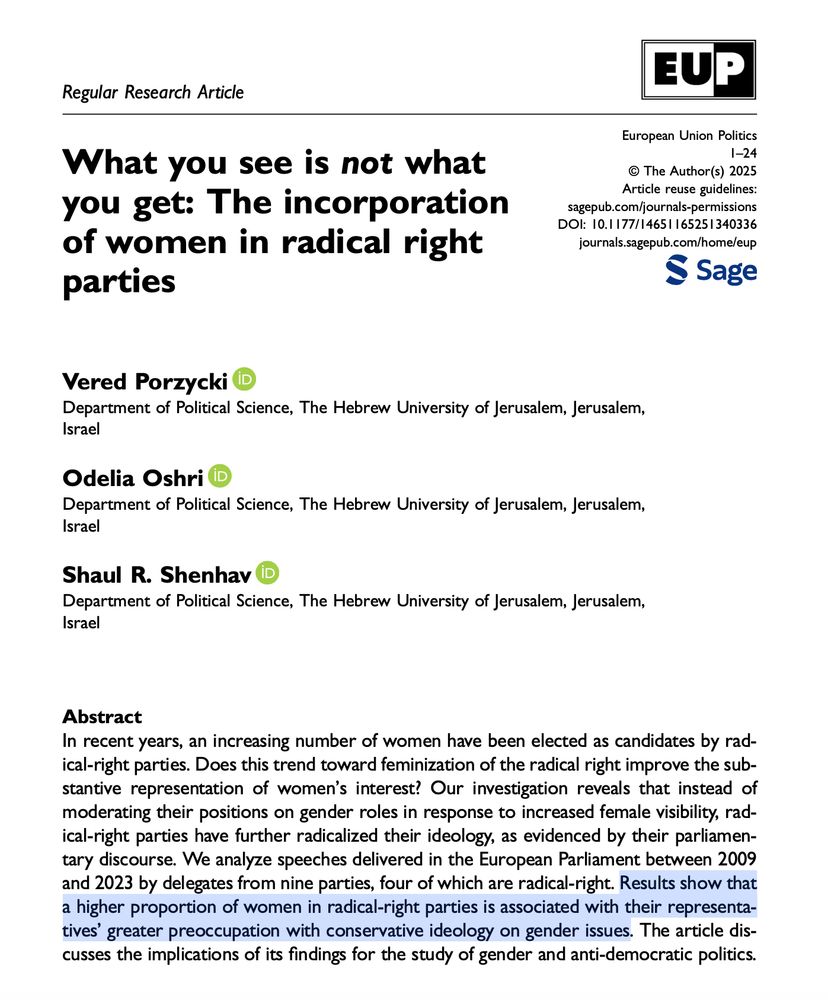
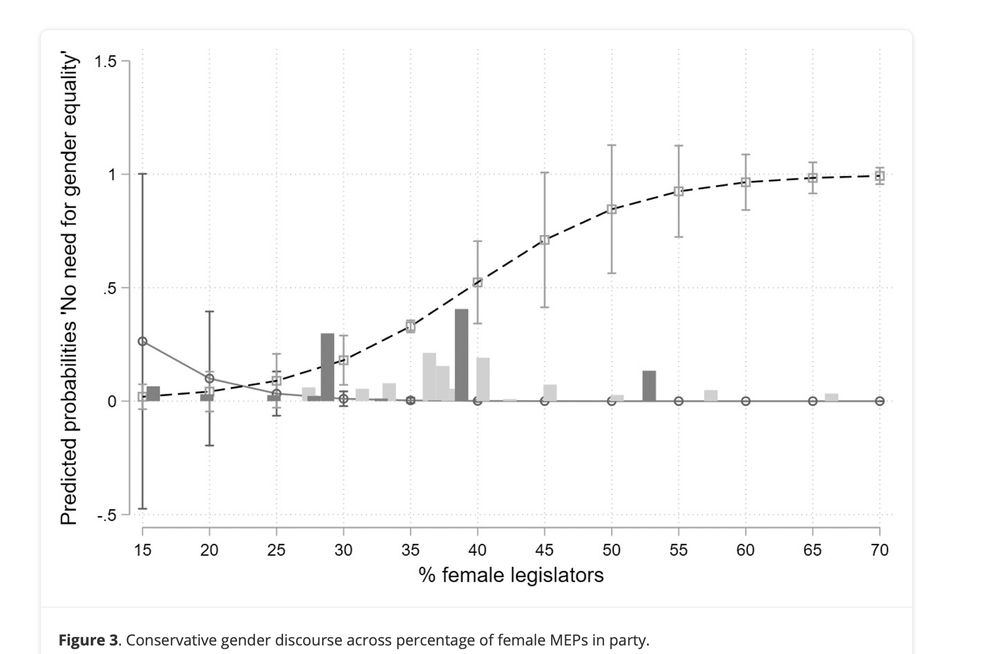
This is a very interesting observational paper for those working on gendered dynamics of far-right, descriptive rep & femonationalism
Does women's descriptive rep. lower anti-gender discourse among far-right? No, it *increases* it (according to parl speech data 2009-2023)
doi.org/10.1177/1465...
26.05.2025 11:14 — 👍 54 🔁 19 💬 3 📌 1
⬇️New week - new publication ⬇️ This time we focus on the 2024 EP elections🗳️
Thanks for putting this @wepsocial.bsky.social symposium together @simonhix.bsky.social!
26.05.2025 08:44 — 👍 12 🔁 6 💬 0 📌 0
🚨⬇️Publication alert ⬇️🚨
How did public and party priorities interact during the 2024 European Parliament elections? Take a look at @alexhartland.bsky.social 's summary on how our work contributes to a better understanding of issue voting.
Ah, it's also #openaccess :)
26.05.2025 07:37 — 👍 5 🔁 2 💬 0 📌 0
We are very grateful to @simonhix.bsky.social for organising the symposium of which this work is a part, and the @wepsocial.bsky.social editors and two anonymous reviewers for a smooth and constructive review process
Thanks also to @politicsunisaar.bsky.social and ActEU colleagues for their support
26.05.2025 07:20 — 👍 5 🔁 1 💬 0 📌 0
We then used Llama3 to classify open-ended MIPs for our individual-level salience measures (along similar lines to @jonmellon.bsky.social et al 2023)
Our data comes from the Horizon Europe-funded #ActEU survey, which also supplies the PTVs and control variables
26.05.2025 07:20 — 👍 8 🔁 1 💬 1 📌 0
Our paper has a novel methodological contribution too, using a fine-tuned manifestoBERTa model to provide the first (as far as we know) published classification of the Euromanifestos (AT, CZ, DE, DK, ES, FI, FR, GR, IT) for our party salience measures
Contact @giucarny.bsky.social for more on this!
26.05.2025 07:20 — 👍 8 🔁 2 💬 1 📌 0
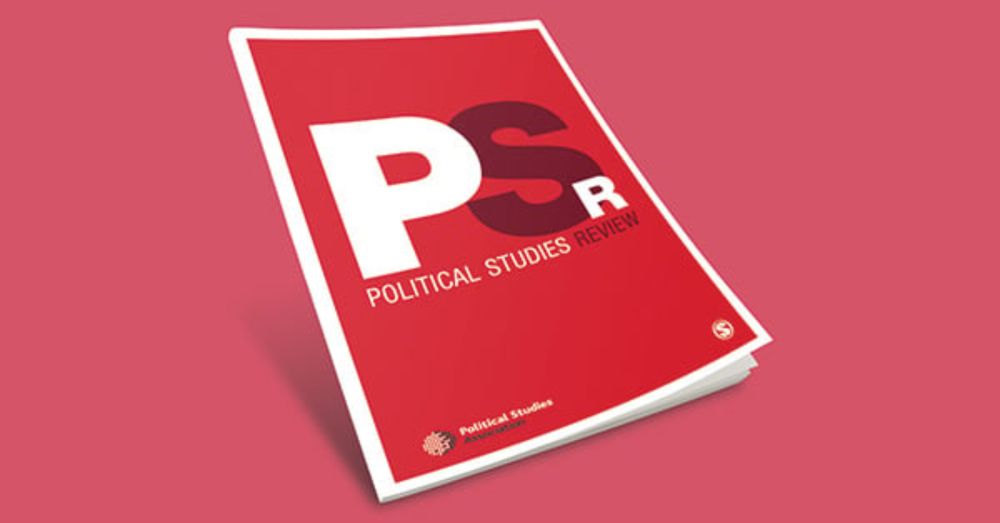
A Review of Public Issue Salience: Concepts, Determinants and Effects on Voting - James Dennison, 2019
In this article, I offer a review of the uses and findings regarding public issue salience in the political science literature, with a focus on electoral behavi...
Our work contributes to a better understanding of party priorities in EP elections, and issue voting in general, particularly on the role of elite- and individual-level salience. See work by @jamesrdennison.bsky.social, whose 2019 article pointed us in the right direction: tinyurl.com/2s38wpmb
26.05.2025 07:20 — 👍 6 🔁 1 💬 1 📌 0
Although many parties emphasise EU polity issues, we find this has little to no connection with the public, similarly so for defence and the economy.
This indicates some mismatch between party and public priorities and a dilemma for the parties
26.05.2025 07:20 — 👍 4 🔁 0 💬 1 📌 0
Publishing original and substantial contributions to the study of comparative European politics. A journal from the European Consortium for Political Research (ECPR) https://ejpr.onlinelibrary.wiley.com/journal/14756765
Professor at the University of Bamberg |
Head of the Research Department for Migration and International Labour Studies at the Institute for Employment Research | Sociology | ISA RC28 treasury/secretary
European Political Economy and Social Research | Postdoctoral Researcher Saarland University.
Max Weber fellow at European University Institute, RSCA
Migration, attitudes, integration
Political science PhD @univie.ac.at | she/her
Researching how citizen respond to independent politicians | Political behavior, parties, technocracy, women & politics
https://jeannezmarlier.notion.site/
Working on political participation, protest, responsiveness, and public opinion
PostDoc @ University of Münster w Daniel Bischof
Previously PhD @ University of Gothenburg
https://elenaleuschner.github.io
Political sociologist at Humboldt University Berlin・Class, morality, cleavage politics・🔗 linuswestheuser.com ・Buch »Triggerpunkte«, Suhrkamp ・ 🍞+🌹
Monitoring Social Change in Europe 🇪🇺 since 2002 | The European Social Survey European Research Infrastructure Consortium (ESS ERIC) is a biennial survey measuring public attitudes and behaviour.
https://europeansocialsurvey.org
Professor of Political Science @goetheuni.bsky.social Frankfurt, Co-Director of @infer-frankfurt.bsky.social
@erc.europa.eu grant on the Politics of the Latent Educational Cleavage
https://sites.google.com/site/juliangarritzmann
Postdoc @milanlp.bsky.social
Associate Professor, School of Political Sciences, Aristotle University of Thessaloniki
Editors: Klaus H. Goetz, Dorte Sindbjerg Martinsen, Wolfgang C. Müller. Posts by social media editor @martingross.bsky.social
WEP on LinkedIn: https://www.linkedin.com/company/west-european-politics/
PhD student at Oxford, researching political attitudes and psychology. Website: https://edmund-kelly.github.io/
💼 Ass. Prof. for Participation Research @uniheidelberg.bsky.social | PI, The New Climate Divide (Emmy Noether) | Guest @wzb.bsky.social
🔬 Parties • Movements • Participation • Climate Politics
📊 Quant Methods | 🇪🇺 Western, Central & Eastern EU
🏃🚴🌄
she/ her | Researcher at Center for Advanced Internet Studies (CAIS) @cais-research.bsky.social | PhD candidate at @compcommlab.bsky.social at U of Vienna | 🔎 marginalization, bias, racism and polarization in media and CSS methods.
ahrkat.github.io
Research Associate | PhD Candidate | Hamburg University
Political & Climate (Protest) Communication
Website: https://www.hendrik-meyer.com
Google Scholar: https://scholar.google.com/citations?user=j3fDB9oAAAAJ&hl=en
comparative political behavior, 🇪🇺 politics, measurement, surveys | Research Fellow for #ActEU HorizonEU and TA at Aristotle University.
Researcher, likes data, graphs, infographics and telling stories with data. PhD in political analysis from Sussex uni - like all social science subjects. Mainly post about political analysis and my research within the Hastings & Rye area. Fabian member.
PostDoctoral Researcher in Political Science: Elections, Political Behavior, Political Parties, Generational Effects.
@Humboldt-Universität zu Berlin
@IPZ - University of Zurich
(he/him)
Politikwissenschaftlerin (group representation, parties, text-as-data). Doctoral student at @DemokratieGoe, research fellow at @manifesto_proj








